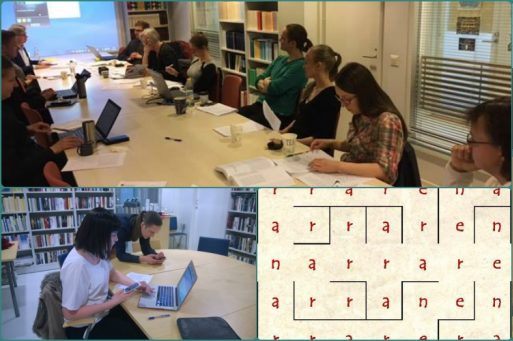
News
Narrare: Centre for Interdisciplinary Narrative Studies at Tampere University, Finland

Narrare: Centre for Interdisciplinary Narrative Studies (2014– ) at Tampere University advances the internationally renowned and interdisciplinary work that our team in literary studies and social sciences has been doing for more than two decades.
Narrare brings together researchers in literary studies, social sciences, game studies, media and journalism, history, philosophy, education, psychology, health sciences, political science and administrative studies. The centre’s essential aim is to develop consistent narrative-theoretical methodology for all disciplines working with narrative.
The Symposium: Applied Narratology will be held in Tampere University on April 2-3, 2020, organized by the Narrare Centre.
In the last few years, a proliferation of applications of narrative theory in fields such as medicine, education, criminology, marketing, public policy, etc. has taken place. With that, ‘applied narratology’ has become a possibility: a field facilitating the transfer of narratological methods and findings to professional practices of narrative. This symposium is meant to explore the possibilities of this emerging field, but also to critically assess it.
During two days of keynotes and paper presentations, we wish to be among the first to define and characterise what ‘applied narratology’ could be, but also to ask the necessary critical questions. How well do narratological concepts survive outside their traditional habitat, the study of literary texts? How do they change when applied to practical tasks such as guidance councelling, medical training or immigrant integration? Can the growing popularity of practical applications be explained by institutional pressure and the worldwide decline in humanities, and is this a cause for concern?
One point of departure for this symposium is the acknowledgment of the fact that narratology, by definition, is inimical to questions of application. After all, it was originally conceived as a science of literature dedicated to building general models of narrative structure. For a long time, if the notion of “applied” was considered at all, it was taken to refer to the practice of narratological criticism – the analysis of individual literary texts. The purpose of generating narratological concepts was to enable the scientific exploration and elaboration of narratives on a theoretical level, divorced from practical endeavours. Can, could and should narratology be taken beyond its academic comfort zone? And if so, can we envision an ethical “applied narratology” where narratology’s insights into how stories function are not just commodified for professional storytellers such as marketers and spin doctors, but also made available to the public so as to increase ‘narrative savviness’ – the ability to see through the narrative tricks of those professional storytellers?


